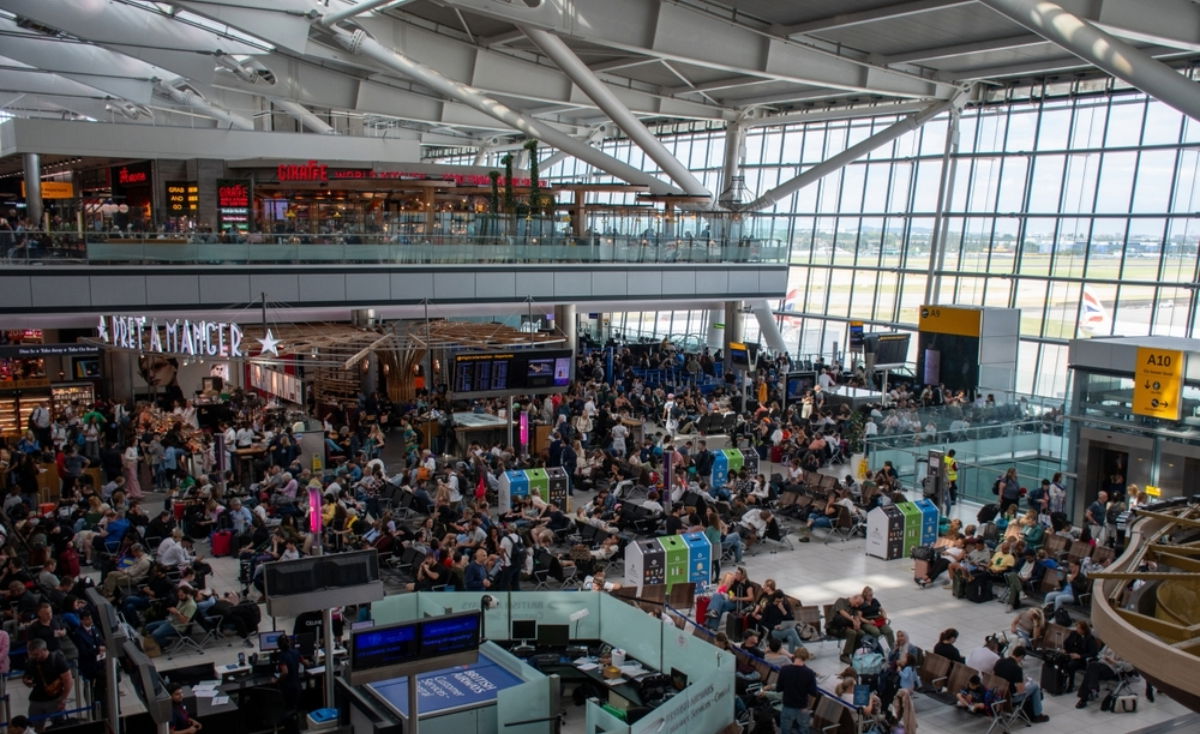Bussiness
Alison Rose on ThinkIn: Overcoming barriers to female entrepreneurship and serving customers through difficult times – London Business News | Londonlovesbusiness.com

Alison Rose is best known as NatWest Group’s first female CEO and the creator of the Rose Review of Female Entrepreneurship, which has proved pivotal in opening opportunities for women in business. Today, she is a senior adviser to the private equity firm Charterhouse and a trustee of the Business in the Community (BITC) board.
Dame Alison Rose has appeared on various podcasts, including James Harding’s ThinkIn. On this podcast, the co-founder of Tortoise Media interviews guests like Alison about the biggest challenges of the 21st century.
As James explains, it’s rare to find a podcast interview with a CEO like Alison who has shaped a large organisation but also, by extension, the way the economy and society work.
In this episode, Alison discusses her work widening access to entrepreneurship for women in business and explains how she contributed to NatWest’s inclusivity for all customers during the Covid-19 pandemic.
Rewinding to Alison Rose’s first days at NatWest
Reflecting on her first days at NatWest as a graduate in 1992, Alison remembers thinking that “the building looked quite intimidating.”
Once inside, this didn’t change — it “felt like the first day of school,” Alison says. “I had no idea what I was getting into… Banking is surrounded by jargon, so it’s only really when you get to do the job that you understand what it’s about.”
Having landed a place on NatWest’s graduate programme, Alison found herself trying “lots of different things,” which allowed her to “learn a huge amount” about herself. This way, she could “figure out what [she] liked,” “what [she was] good at,” and “evolve.”
Alison Rose started as an analyst associate who reported to several managing directors. They were “all completely different” with “different ways of doing things,” she says.
“One person would ask [me] to do something one way and someone another way, but it was a brilliant learning experience because [I’d] see different ways of doing things and think, ‘Oh, that’s a really clever way of dealing with that situation.’”
Alison soon found the appeal in collecting feedback from several managers. “The most important thing I learnt is that banking is very much a team-based sport,” she says. Because of this, her career gravitated into leading “teams working together for an outcome, rather than the individualistic nature of other areas of the bank.”
The Rose Review: Overcoming barriers to female entrepreneurship
Fast forward a few years, and Alison — having led the commercial and private banking divisions of the Natwest Group, where she understood extensive work establishing the Free Accelerator Hub Network across the UK to support Entrepreneurs, Alison then led a Government led review into the Barriers affecting female Entrepreneurs – The Rose Review. Not only does the review raise awareness of barriers that women in business face, but it also outlines practical initiatives that can help overcome these challenges.
“The barriers we found with the Rose Review were significant and unique facing female entrepreneurs. One key barrier was the lack of access and awareness of capital,” and being able to fund and finance from start up to scale up accessing the right route to access funding and capital is critical to success. Alison says. “Particularly for entrepreneurs, it’s often not bank financing. It’s venture capital (VC) and equity financing.”
Many female entrepreneurs don’t have access to finance opportunities, and many have never received tools and opportunities relating to role models and risk awareness (“not risk aversion,” Alison clarifies). Importantly it is finding the right support to help the journey and also the right type of financing – over levering with debt too early provides too much burden on businesses often with limited cashflow , as well as giving too much equity away too early.
For additional context, Alison explains that some of the barriers “are endemic in society in terms of not enough young girls thinking about entrepreneurship as a career.” However, organisations like banks, VCs, and the government can intervene to help remove these barriers.
“Big organisations connected into an ecosystem with access to support, advise and capital can do something about it,” Alison says. “But it’s not as simple as saying, ‘Lend more money.’ It’s much more complex than that, which is why it has to be a multifaceted approach to intervention.”
Alison explains that the Rose Review’s efforts to raise awareness, improve access, and make it easier to secure finance have “made a massive, difference” to women in business. She is keen to make this difference where “there’s massive potential that’s not being supported.”
“Banks are in service of the economy and in service of customers,” she explains. They need to consider where the economy needs to grow — the areas that are underrepresented.
“For me, that really is coming back to the balance between creating a balanced return and support across the economy,” Alison says. “So not entirely for shareholders, not entirely for customers, but that balance needed for all stakeholders.”
The impact of Covid-19 on female entrepreneurship
Covid-19 added a heavy stressor to business for many women. Alison and her colleagues conducted research that revealed many female entrepreneurs found it more stressful to run a business during the pandemic than their male counterparts.
This may, in part, have been because school closures saw many female entrepreneurs spend more time supporting their families and less time on their businesses. Alison saw this not only in the entrepreneurial space but also in her teams at NatWest.
Despite the impact that the pandemic had on female entrepreneurship, Alison saw the demand for this entrepreneurship resurge just as strongly. To meet this demand, she invested efforts into making support tools available online, which numerous female-led businesses benefited from.
Her team also launched a billion-pound fund for female entrepreneurs. It was fully drawn down earlier than expected, so she doubled it to two billion.
Supporting small businesses through NatWest
While many banks allocate lots of capital to the housing sector, Alison was keen to deploy lending to small businesses during her tenure at NatWest. As the largest commercial and small-to-medium-enterprise (SME) bank, “we put a huge amount of lending into different sectors,” Alison says.
Alison believes that relationships should drive the way that banks operate with businesses, and her aim at NatWest was to build a relationship-led bank with smart digital and technological tools. With this goal in mind, she launched 14 free Entrepreneur Accelerators across the UK where business owners can access advice and guidance, as well as work space.
“I set up the Entrepreneur Accelerators to make sure there is dedicated help for entrepreneurs,” Alison says. “Sometimes putting debt in isn’t the answer, but we can connect to the right partners who can help.”
She worked to overcome the challenge of ensuring there is local support for entrepreneurs up and down the country. “If you’re running a business, you want someone who’s going to be there to help you and get the support in the way you want it,” she says.
Serving customers across the UK throughout Covid-19
Alison explains that, during the Covid-19 pandemic, banks’ returns diminished significantly. This was because the drop in the interest rates throughout the three-year period “knocked around a billion pounds of income off the earnings of banks.”
As the profitability of banks dropped, they had to become more efficient to continue covering costs associated with payment systems, branches, staff, and investors. Along with covering these costs, Alison notes that banks had to continue supporting people across the board, “from the most vulnerable to the most sophisticated.”
NatWest dedicated itself to serving customers of all demographics, unlike fintech banks, which can pick a specific customer group or segment. Many of these banks “start with entirely digital operations — no cash, no branches, no vulnerable requirements,” Alison explains. This doesn’t suit everyone. Many people want to visit a branch to handle their banking needs.
While these fintech and startup banks “pick and choose their customers,” Alison’s teams took “elements of society that are excluded seriously,” providing:
- Cash
- Branches
- Community bankers
- Mobile vans
- Training and development opportunities
- Community programmes
- Dedicated teams who support vulnerable people and partner with organisations to offer additional support
“A lot of the shift to digital has been largely driven by the behaviour of customers and the development of tech,” Alison says. “But we continued to support the most vulnerable and the ones who don’t have access to cash or technology through different means.”
Her team ensured they could “serve all customers,” which came at the price of having to “constantly tune [their] operating model to make returns.” If they weren’t profitable, they wouldn’t be able to build capital, which meant they wouldn’t be able to lend money, which meant they wouldn’t be able to support the economy.
How Alison Rose managed the post-covid return to the office
In her role as CEO at NatWest Group, Alison oversaw the return-to-office process when Covid-19 lockdown rules eased. She opted for a hybrid approach to suit the customer service divisions she managed.
The pandemic “busted a few myths” about how team members should perform their jobs, Alison notes. Not everyone needs to sit at a desk in-house. However, she also had to take the organisation’s “culture and collaboration” into account when deciding who should work in-house.
She reflects that some of the team members needed to return to the office 100% of the time for customer service to run as smoothly as possible. Others could be completely remote, and others could be hybrid.
Alison was also “mindful of the demographics” when planning her teams’ return to the office, ensuring that young interns and graduates worked in-house so they could learn on the job (as she did when she joined NatWest). “You want to be able to turn to someone and say, ‘How do you do that?’ or ‘What would you do?’” Alison says.
It was important to “create moments for people to come together for collaboration, culture, connectivity, and innovation.” This was especially key for new joiners, who Alison wanted to give “more time in the office to connect and learn with more senior people.” This would ensure they received a “transfer of culture and skills.”
Alison Rose on the power of people
Wherever team members are working, “the strength of any bank is its people,” Alison says. “One of the things I’m really proud of is, right the way through the pandemic, our branches stayed open where they could to support people.”
She is particularly proud of the call programme NatWest launched for vulnerable customers. “We called over a million people just to check in and make sure they were okay, particularly the most vulnerable who had to isolate the most,” Alison says.
Watch Alison Rose on ThinkIn with James Harding.
About Alison Rose
The first female CEO of a major British bank, Alison Rose has paved the way for women in business to access the opportunities, tools, and support they need to launch and grow ventures.
In 2023, she was appointed Dame Commander of the Order of the British Empire for her transformative work in the finance sector. She also appeared in Vogue’s 2019 Top 25 Influential Women List and the 2018 Women in FinTech Powerlist.










